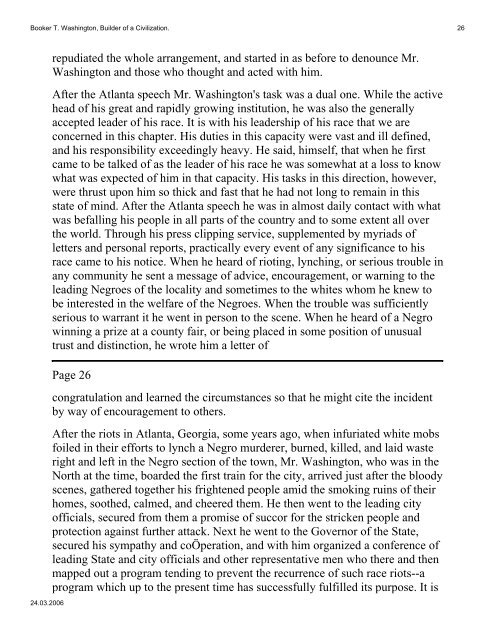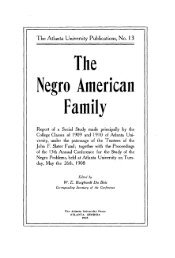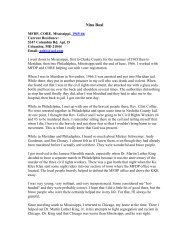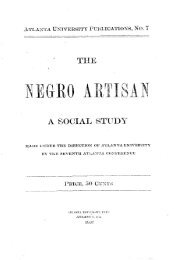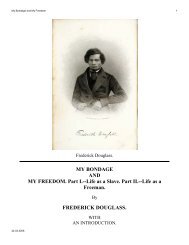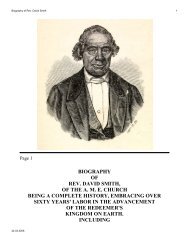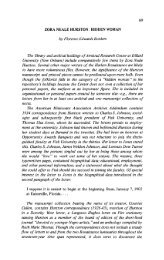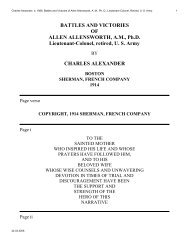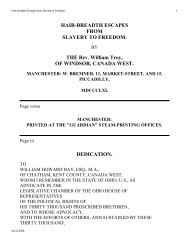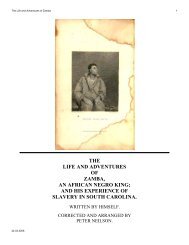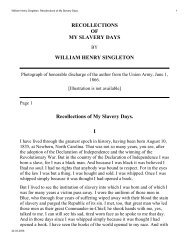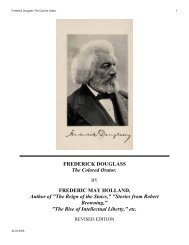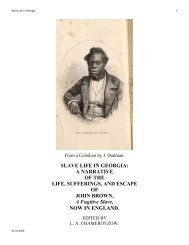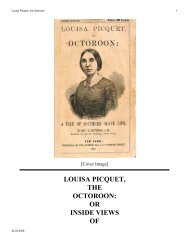Booker T. Washington, Builder o - African American History
Booker T. Washington, Builder o - African American History
Booker T. Washington, Builder o - African American History
You also want an ePaper? Increase the reach of your titles
YUMPU automatically turns print PDFs into web optimized ePapers that Google loves.
<strong>Booker</strong> T. <strong>Washington</strong>, <strong>Builder</strong> of a Civilization. 26<br />
24.03.2006<br />
repudiated the whole arrangement, and started in as before to denounce Mr.<br />
<strong>Washington</strong> and those who thought and acted with him.<br />
After the Atlanta speech Mr. <strong>Washington</strong>'s task was a dual one. While the active<br />
head of his great and rapidly growing institution, he was also the generally<br />
accepted leader of his race. It is with his leadership of his race that we are<br />
concerned in this chapter. His duties in this capacity were vast and ill defined,<br />
and his responsibility exceedingly heavy. He said, himself, that when he first<br />
came to be talked of as the leader of his race he was somewhat at a loss to know<br />
what was expected of him in that capacity. His tasks in this direction, however,<br />
were thrust upon him so thick and fast that he had not long to remain in this<br />
state of mind. After the Atlanta speech he was in almost daily contact with what<br />
was befalling his people in all parts of the country and to some extent all over<br />
the world. Through his press clipping service, supplemented by myriads of<br />
letters and personal reports, practically every event of any significance to his<br />
race came to his notice. When he heard of rioting, lynching, or serious trouble in<br />
any community he sent a message of advice, encouragement, or warning to the<br />
leading Negroes of the locality and sometimes to the whites whom he knew to<br />
be interested in the welfare of the Negroes. When the trouble was sufficiently<br />
serious to warrant it he went in person to the scene. When he heard of a Negro<br />
winning a prize at a county fair, or being placed in some position of unusual<br />
trust and distinction, he wrote him a letter of<br />
Page 26<br />
congratulation and learned the circumstances so that he might cite the incident<br />
by way of encouragement to others.<br />
After the riots in Atlanta, Georgia, some years ago, when infuriated white mobs<br />
foiled in their efforts to lynch a Negro murderer, burned, killed, and laid waste<br />
right and left in the Negro section of the town, Mr. <strong>Washington</strong>, who was in the<br />
North at the time, boarded the first train for the city, arrived just after the bloody<br />
scenes, gathered together his frightened people amid the smoking ruins of their<br />
homes, soothed, calmed, and cheered them. He then went to the leading city<br />
officials, secured from them a promise of succor for the stricken people and<br />
protection against further attack. Next he went to the Governor of the State,<br />
secured his sympathy and coÖperation, and with him organized a conference of<br />
leading State and city officials and other representative men who there and then<br />
mapped out a program tending to prevent the recurrence of such race riots--a<br />
program which up to the present time has successfully fulfilled its purpose. It is


